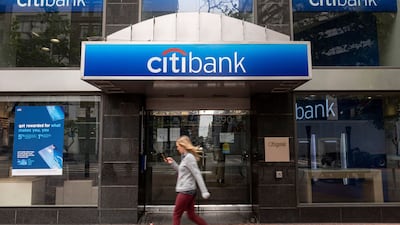Citigroup has secured approval from Saudi Arabia to establish its regional headquarters in Riyadh, marking a significant step forward in the kingdom's efforts to attract global financial institutions to set up operations within the country.
The Wall Street giant has obtained approval from the Saudi Ministry of Investment, according to a staff memo seen by The National.
“This is an important step for Citi in Saudi Arabia that demonstrates Citi’s ongoing commitment to the kingdom … and to our support of the country’s economic growth and transformation,” said Fahad Aldeweesh, chief executive of Citi Saudi Arabia, in the memo.
“This achievement marks a significant leap forward for our franchise in Saudi Arabia and we look forward to our continued growth in the kingdom.”
Focus on Middle East
Citigroup, the third-largest banking institution in the US by assets, is focused on the Middle East to boost its global growth.
The bank sees growth in the region continuing despite global economic headwinds, especially in Saudi Arabia and the UAE, on the back of rising foreign direct investment flows, the bank’s chief executive Jane Fraser told The National in an interview in May.
Over the past three years, Citigroup’s revenue in the Middle East and Africa has recorded double-digit growth and the region was the fastest-growing cluster globally for the bank in that period.
Following today’s news, Citigroup’s share price jumped more than 1 per cent to trade at $69.69 at 7.40pm UAE time (10.40am New York time) on Friday. The stock has surged 31.4 per cent so far this year.
The New York-headquartered financial services firm reported a net income of $3.2 billion in the third quarter, down from $3.5 billion in the same period last year. The dip was primarily driven by the higher cost of credit, the bank said last month.
However, revenue surged almost 1 per cent annually to $20.3 billion in the last quarter.
Saudi Arabia attracting foreign firms
In May, Goldman Sachs became the first Wall Street bank to secure a licence in Saudi Arabia to set up its regional headquarters in the kingdom.
In April, BlackRock, the world's biggest asset manager, signed an agreement with Saudi Arabia's Public Investment Fund to accelerate the growth of capital markets in the kingdom by launching a Riyadh-based, multi-asset investment management platform.

Earlier this year, Saudi Arabia introduced a regulation for foreign companies to set up regional headquarters in the kingdom or risk losing out on government contracts.
However, companies with foreign operations not exceeding one million Saudi riyals ($266 million) can operate in the kingdom without local headquarters.
The kingdom has released a series of new regulations in the past few years aimed at providing more clarity in attracting foreign investment into the kingdom.
The new regulations include companies law, civil transactions law, amendments to labour law as well as newly updated investment law approved by the Council of Ministers in August.
The kingdom launched its Vision 2030 programme in 2016 to diversify its economy away from oil, support private-sector growth, improve female workforce participation and reduce unemployment among citizens.
It also set a target to attract $100 billion annually in FDI by 2030 to boost non-oil gross domestic product and has set a goal of increasing FDI to 5.7 per cent of GDP by the end of the decade.


